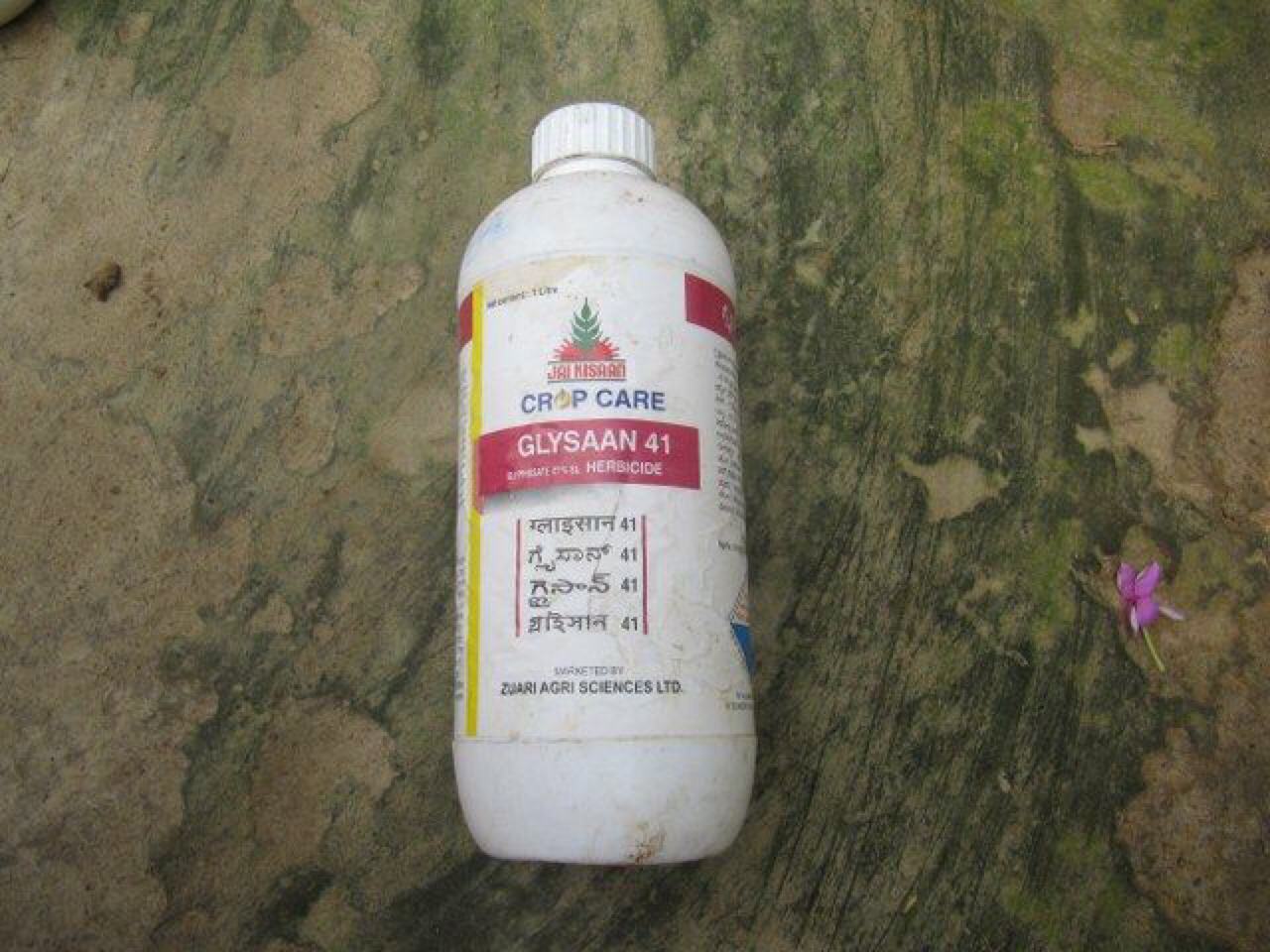The talks in Bangaluru, on July 7th and 8th are on glyphosate but should cover following three angles:
- The science
- How India is suspected being mass poisoned
- Need for Citizen activism
The science itself is complex, and starts with the problem that in todays world, science is no more neutral and public funded, nor geared to serve for public good. It is privately funded, owned or controlled and has been tampered to give a biased view on wide ranging issues from evolution to climate change all the way to – you guessed it – safety of glyphosate, as well as the safe maximum residue limits of it in various foods.
And then, there is the problem of exactly what glyphosate does, that kills the plants and what happens when it is present in the food of animals. There is a need to understand how the plant kingdom evolved from single celled organisms, and how the animal kingdom evolved once the plant kingdom had already covered the ground. At a cell biology level, there is a need to understand the critical roles played in all this by bacteria, on how they process or manufacture food, and how they assist in digestion to immune response in host animals. There is a need to understand Shikimate pathway and its influence, directly or indirectly on the living world.
Having said that, all this can be easily explained without making the talk technical. I have found that average folks have well understood these issues, including rural folks, without much trouble. The knowledge however, brought them to realize exactly how dangerous glyphosate is, and a better understanding of its long term effects, some of it virtually irreversible, on human and animal health.
Then there is the issue of how glyphosate has penetrated India, from coast to the mountains. Information is still trickling in, but the picture already looks grim. India is being mass poisoned at multiple levels and there is no knowledge of testing of glyphosate concentration in various foods and disclosure of results for the people. In this area, India is not alone. No country wishes to touch that Pandora’s box. Canada is the sole exception.
Lastly, the topic of citizen activism – from my own unique angle, perspective, and history of it in Canada. I have been told that whatever I did to push the Canadian Government, is only possible in Canada and not in India. I disagree. Anyhow, these will be issues for discussion.
It all started with me coming to India to sell a property, and staying back longer than anticipated. Debal Deb provided the next catalyst – inviting me to spend a week in his farm I Odisha where he is busy conserving over 1,500 kinds of folk rice, organically, along with other crops, while same time influencing nearby villages and lots of farmers to do the same and cut all links with industrial chemicals or patented seeds, genetically modified as well as those that are “high yield hybrid” kinds.
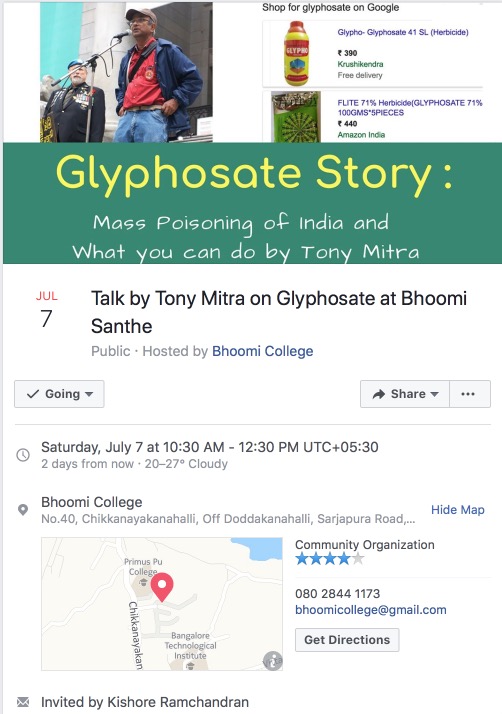
Bhoomi, Bangaluru. No.40, Chikkanayakanahalli, Off Doddakanahalli, Sarjapura Road, Bangalore, India 560035. Date/Time : Saturday 7th July 2018 – 10:330 AM
Debal also grows lots of other vegetables, and has a complex system in place to maintain soil nutrient levels without pumping industrial chemicals. The techniques are experimented under local conditions and successful ideas picked up by local farmers.
Anyhow, the place is off grid, with no power, no piped water, no TV and virtually no internet. Solar power lamps help inside the zero carbon footprint mud walled thatched root lodges. But after nightfall, one thing we could do, was talk. So I ended up speaking about glyphosate and my knowledge acquired through connections with Anthony Samsel, Stephanie Seneff, and others, and the fact that glyphosate mimics glycine.
To cut a long story – Debal asked me to consider speaking about it at his study circle talk in Kolkata.
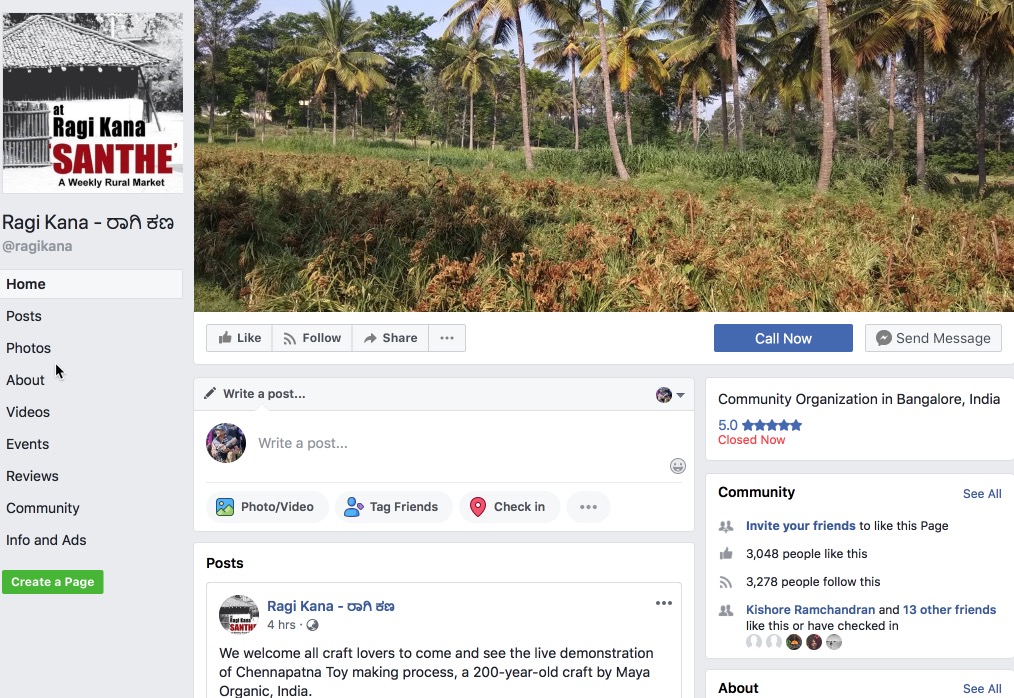
Ragi Kana – IDBI layout, Ganesha temple bus stand, Gottigere Bangalore, India 560083. Tel 099726 76426. Date/Time of talk – late morning, Sunday 8th July 2018
As such I did not come to.India to talk to people about glyphosate, and have a mixed feeling about the usefulness of speaking to people. I have found it very easy to impress people by talking, but very hard to influence them enough to get to do anything meaningful beyond engage in symbolism. Citizens activism may involve trying to influence politicians that allow chemicals like glyphosate to invade our world. Instead, I found it more productive to push the do-nothing Government myself, even single handed. This in turn seems to influence more folks to look at this “individual activism” in a new light. Anyhow, that is where I keep busy back in Canada.
Meanwhile, here in India, I agreed to talk at Debal’s study circle, because he said India does not know much about glyphosate, especially about it being an analog of glycine and the implication of that at the cell biology level for all of us creatures. Also, I had more recent information from Anthony Samsel and Stephanie Seneff regarding glyphosate being found in the proteins and tissues of various human and animal samples as well as vaccines which the people deserves to understand, including how one tests presence of glyphosate already inside a protein.
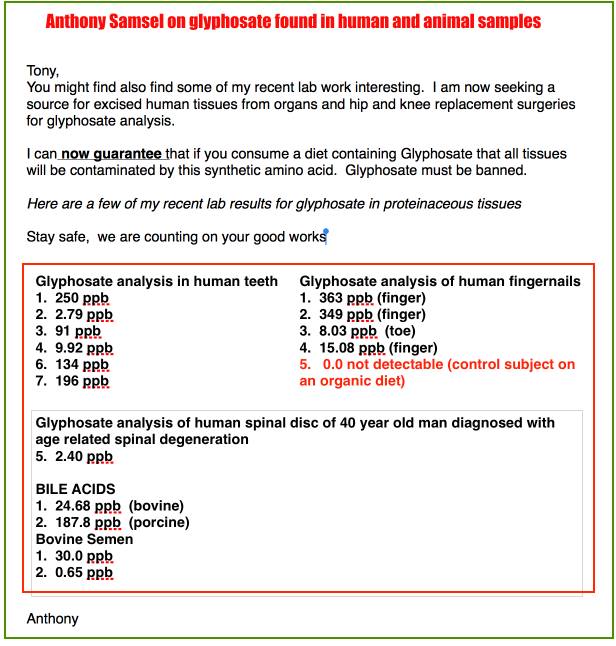
Note from Anthony Samsel, from June 2018, regarding his most recent discovery of glyphosate in human and animal samples.
That talk at Debal Deb’s study circle, started a small but steady movement. I was asked to speak at two more places in Kolkata and one in Delhi.
There is a possibility that I might have to visit Punjab for a few days soon.
Meanwhile, two different but closely attached organizations asked me to speak in Bangaluru, on July 7th Saturday at Bhoomi Santhe, Bhoomi College and July 8th Sunday, 2018 at Ragi Kana.
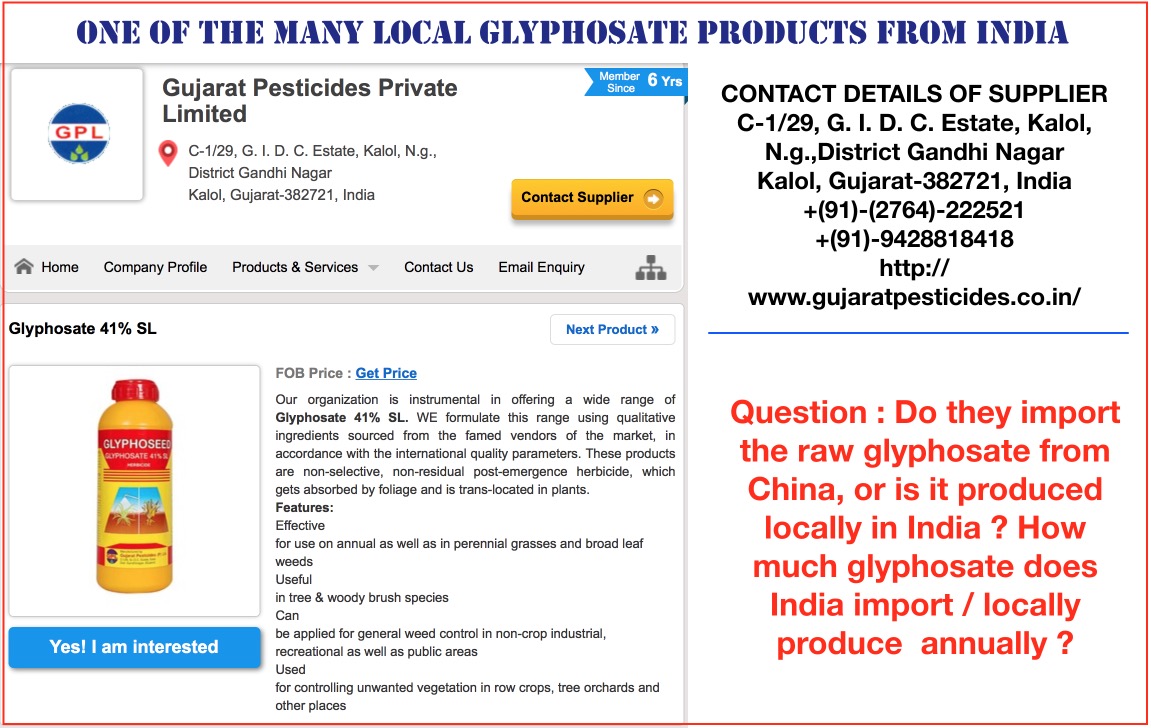
Meanwhile, my computer had crashed due virus attack which locked my keyboard. I had to call Apple care in India. A young woman from Bangaluru came on phone and remotely helped reformat my laptop hard disk through the internet and helped me re-install applications and data. Now back on track, I start mulling what part of new information should go into the talks, which cover at least three subjects on glyphosate – a) science b) activism c) India. Each where mostly uncharted territory here in India with regard to glyphosate. In my time here, I have learned a lot of how India is getting glyphosate poisoned, both from imported pulses, as well as a reckless use of all kinds of brands and unbranded concoctions containing glyphosate.
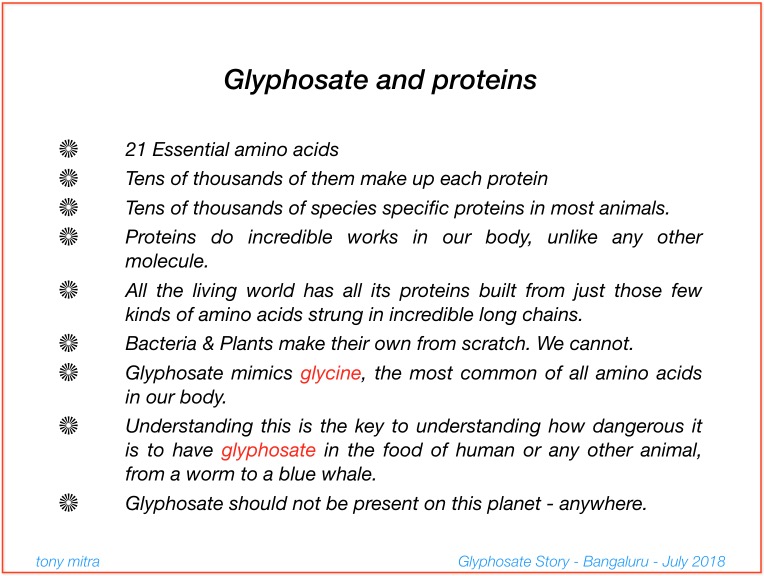
It is the Wild West of glyphosate – right here in India. The chemical pedlars are passing these as “soil medicine” to rural folks that cannot pronounce glyphosate and have no idea whatsoever what it is. It has reach all corners of India, from the coast to the Himalayas, even in difficult to reach remote areas, in rubber plantations, tea gardens and everywhere in between.
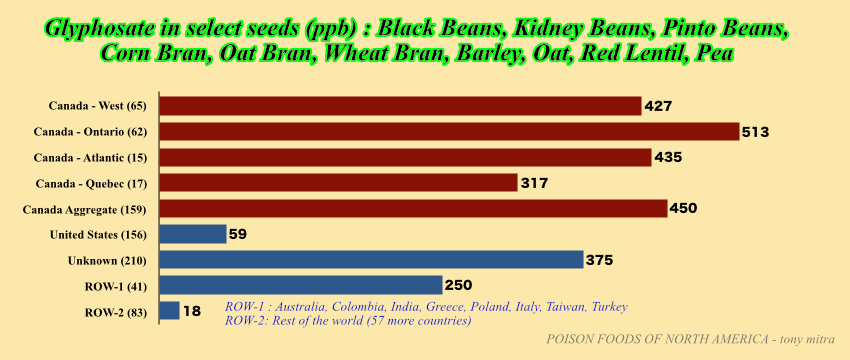
Chart from the book – POISON FOODS OF NORTH AMERICA. As can be seen, India (ROW 1), second from bottom, is in a group that does not do too well with regard to average levels of glyphosate in their food. Why is that? Is it because of imported pulses, or from homegrown contamination. One may not know unless India starts vigorously testing its foods on one side, and finds ways to seriously control the mindless use of glyphosate as “soil medicine” sold by unscrupulous vendors.
Right next door in Sri Lanka, farm workers are dying from kidney failure due to use of glyphosate spray on sugarcane crops or tea garden workers that use glyphosate for controlling weeds are developing Esophageal cancer. Sri Lanka affected a nationwide ban on glyphosate as a result. What is strange is, in India, there is a complete news blanket on this issue. This also goes to show a lot on what kind of “free press” India has, and what level of awareness is here in India on issues of global poisoning. There is an unreal level of interest in whatever is happening in Europe or North America on this issue, but complete blank on next door Sri Lanka. Why ?
Anyhow, these will be parts of my talk in Bangaluru. The trick is to compress it into a reasonably short talk.
